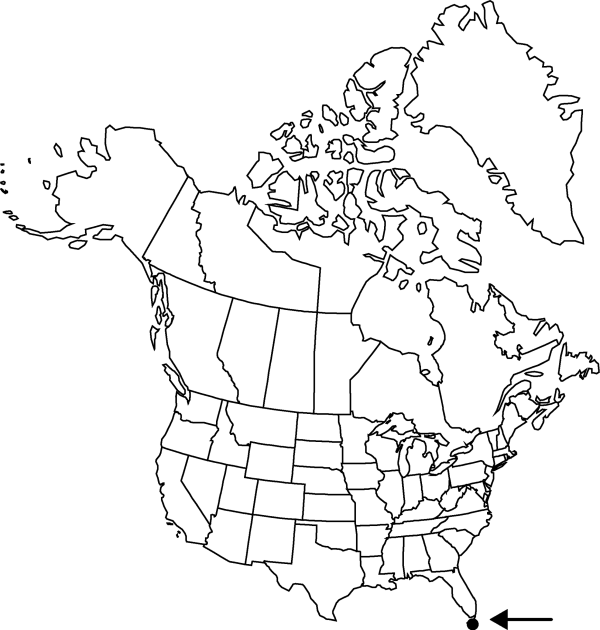Difference between revisions of "Opuntia triacantha"
Hort. Brit., 172. 1826.
FNA>Volume Importer |
imported>Volume Importer |
||
| (7 intermediate revisions by 2 users not shown) | |||
| Line 7: | Line 7: | ||
|year=1826 | |year=1826 | ||
}} | }} | ||
| − | |basionyms={{Treatment/ID/ | + | |basionyms={{Treatment/ID/Basionym |
|name=Cactus triacanthos | |name=Cactus triacanthos | ||
|authority=Willdenow | |authority=Willdenow | ||
| + | |rank=species | ||
| + | |publication_title=Enum. Pl., suppl.: | ||
| + | |publication_place=34. 1814 | ||
}} | }} | ||
|synonyms={{Treatment/ID/Synonym | |synonyms={{Treatment/ID/Synonym | ||
|name=Opuntia abjecta | |name=Opuntia abjecta | ||
|authority=Small ex Britton & Rose | |authority=Small ex Britton & Rose | ||
| − | }}{{Treatment/ID/Synonym | + | |rank=species |
| + | }} {{Treatment/ID/Synonym | ||
|name=Opuntia militaris | |name=Opuntia militaris | ||
|authority=Britton & Rose | |authority=Britton & Rose | ||
| + | |rank=species | ||
}} | }} | ||
|hierarchy=Cactaceae;Cactaceae subfam. Opuntioideae;Opuntia;Opuntia triacantha | |hierarchy=Cactaceae;Cactaceae subfam. Opuntioideae;Opuntia;Opuntia triacantha | ||
| Line 25: | Line 30: | ||
}}<!-- | }}<!-- | ||
| − | --><span class="statement" id="st- | + | --><span class="statement" id="st-undefined" data-properties=""><b>Shrubs,</b> prostrate (to erect), clambering, to 0.6 m. <b>Stem</b> segments easily detached, green, flattened, elliptic, 5–18 × 3–7 cm, slightly tuberculate, glabrous; areoles 3–4 per diagonal row across midstem segment, subcircular, 4 mm diam.; wool whitish. <b>Spines</b> 1–3(–4) per areole, ± evenly distributed on stem segment, porrect to spreading, gray to whitish or cream, tipped black, straight, acicular, to 40 mm, barbed. <b>Glochids</b> yellow, aging brown, 4–9 mm. <b>Flowers</b>: inner tepals yellow throughout, 20–25 mm; filaments pale green to yellow; anthers yellow; style pale green or white, pink tinged; stigma lobes color unknown. <b>Fruits</b> red, ovoid to obovoid, 25–30 × 15–20 mm, fleshy, glabrous, bearing few areoles, spineless. <b>Seeds</b> tan, subcircular, somewhat flattened, 2.5 mm diam.; girdle protruding less than 1 mm. <b>2n</b> = 22.</span><!-- |
-->{{Treatment/Body | -->{{Treatment/Body | ||
| + | |phenology=Flowering year-round. | ||
|habitat=Sandy areas on old limestone reefs, openings in tropical forests | |habitat=Sandy areas on old limestone reefs, openings in tropical forests | ||
|elevation=0 m | |elevation=0 m | ||
|distribution=Fla.;West Indies. | |distribution=Fla.;West Indies. | ||
| − | |discussion=<p>Opuntia triacantha occurs in the flora area only on Big Pine Key, Florida. It is in the Center for Plant Conservation’s National Collection of Endangered Plants.</p> | + | |discussion=<p><i>Opuntia triacantha</i> occurs in the flora area only on Big Pine Key, Florida. It is in the Center for Plant Conservation’s National Collection of Endangered Plants.</p> |
|tables= | |tables= | ||
|references= | |references= | ||
| Line 40: | Line 46: | ||
-->{{#Taxon: | -->{{#Taxon: | ||
name=Opuntia triacantha | name=Opuntia triacantha | ||
| − | |||
|authority=(Willdenow) Sweet | |authority=(Willdenow) Sweet | ||
|rank=species | |rank=species | ||
| Line 47: | Line 52: | ||
|basionyms=Cactus triacanthos | |basionyms=Cactus triacanthos | ||
|family=Cactaceae | |family=Cactaceae | ||
| + | |phenology=Flowering year-round. | ||
|habitat=Sandy areas on old limestone reefs, openings in tropical forests | |habitat=Sandy areas on old limestone reefs, openings in tropical forests | ||
|elevation=0 m | |elevation=0 m | ||
| Line 54: | Line 60: | ||
|publication year=1826 | |publication year=1826 | ||
|special status= | |special status= | ||
| − | |source xml=https:// | + | |source xml=https://bitbucket.org/aafc-mbb/fna-data-curation/src/2e0870ddd59836b60bcf96646a41e87ea5a5943a/coarse_grained_fna_xml/V4/V4_240.xml |
|subfamily=Cactaceae subfam. Opuntioideae | |subfamily=Cactaceae subfam. Opuntioideae | ||
|genus=Opuntia | |genus=Opuntia | ||
|species=Opuntia triacantha | |species=Opuntia triacantha | ||
| − | |||
| − | |||
| − | |||
| − | |||
| − | |||
| − | |||
| − | |||
| − | |||
| − | |||
| − | |||
| − | |||
| − | |||
| − | |||
| − | |||
| − | |||
| − | |||
| − | |||
| − | |||
| − | |||
| − | |||
| − | |||
| − | |||
| − | |||
| − | |||
| − | |||
| − | |||
| − | |||
| − | |||
| − | |||
| − | |||
| − | |||
| − | |||
| − | |||
| − | |||
| − | |||
| − | |||
| − | |||
| − | |||
| − | |||
| − | |||
| − | |||
| − | |||
| − | |||
| − | |||
| − | |||
}}<!-- | }}<!-- | ||
-->[[Category:Treatment]][[Category:Opuntia]] | -->[[Category:Treatment]][[Category:Opuntia]] | ||
Latest revision as of 21:57, 5 November 2020
Shrubs, prostrate (to erect), clambering, to 0.6 m. Stem segments easily detached, green, flattened, elliptic, 5–18 × 3–7 cm, slightly tuberculate, glabrous; areoles 3–4 per diagonal row across midstem segment, subcircular, 4 mm diam.; wool whitish. Spines 1–3(–4) per areole, ± evenly distributed on stem segment, porrect to spreading, gray to whitish or cream, tipped black, straight, acicular, to 40 mm, barbed. Glochids yellow, aging brown, 4–9 mm. Flowers: inner tepals yellow throughout, 20–25 mm; filaments pale green to yellow; anthers yellow; style pale green or white, pink tinged; stigma lobes color unknown. Fruits red, ovoid to obovoid, 25–30 × 15–20 mm, fleshy, glabrous, bearing few areoles, spineless. Seeds tan, subcircular, somewhat flattened, 2.5 mm diam.; girdle protruding less than 1 mm. 2n = 22.
Phenology: Flowering year-round.
Habitat: Sandy areas on old limestone reefs, openings in tropical forests
Elevation: 0 m
Distribution

Fla., West Indies.
Discussion
Opuntia triacantha occurs in the flora area only on Big Pine Key, Florida. It is in the Center for Plant Conservation’s National Collection of Endangered Plants.
Selected References
None.